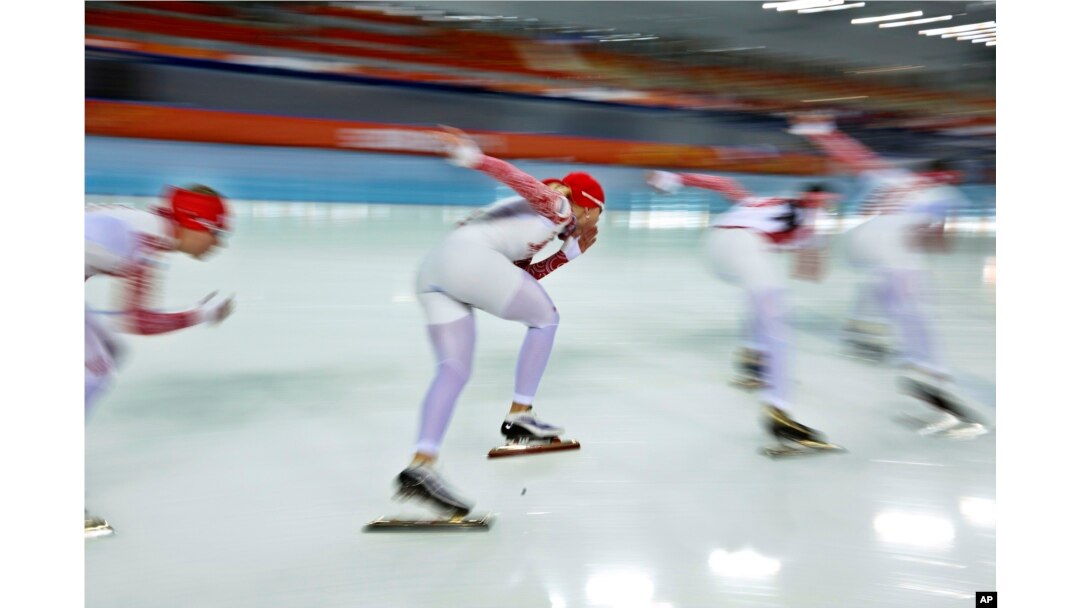SOCHI —
Russia’s Winter Olympics in Sochi have been criticized for corruption and the terror threat to the Games, but Russia is also a target for its treatment of gays. As the opening ceremonies draw near, demonstrators around the world are protesting Russia's tough stance on gays.
Two days before the Friday opening of the Sochi Winter Olympics, people in 20 international cities demanded that Olympic sponsors condemn a Russian anti-gay law. Protesters objected to a law that pushes virtually any public discussion of homosexuality underground.
WATCH: Related video from VOA
From Paris to London to Rio de Janeiro, protesters asked 10 global corporations to condemn Russia’s law.
So far, AT&T is the only Olympic sponsor to do so.
Last week, Human Rights Watch was one of 40 international groups that asked companies to condemn the law.
The U.S.-based human rights group fueled anger Tuesday by posting online a video of violence against gays in Russia. By protest time, nearly 1 million people worldwide had watched it on YouTube.
Tanya Cooper, a Russian researcher for Human Rights Watch, said Russia’s one-year-old law gives a green light to gay bashing.
She said in the video narration, “A vigilante group, Occupy Pedophilia, essentially uses the pretext of protecting children, fighting pedophilia, to harass and attack gay people. They invite them for a fake date and they proceed to berate them for their homosexuality, and in many cases, to abuse them physically. They film all these proceedings and then post them on social networks, on YouTube to humiliate them even further.”
Human Rights Watch says Occupy Pedophilia’s web page hosts hundreds of videos of attacks on gays in more than 30 Russian cities.
President Vladimir Putin has rejected criticism of the gay propaganda law. During a recent visit to Sochi, he said Russia does “not ban anyone or anything,” but added, “That's why you can feel free, relaxed - but leave children in peace, please.”
The Obama administration is not sending any high-ranking officials to Sochi.
Instead, the American delegation includes three openly gay athletes.
American Hudson Taylor directs Athlete Ally, a group that aims to end homophobia in sports. He said he came to Sochi to build bridges.
“There has never been a successful social justice movement for a minority group without the support of the majority. So I think the sense is that there could be other prominent Russian athletes, celebrities, politicians who could show support for the gay community in Russia, that that would go a long way,” said Taylor.
Russian officials show little interest in debate in Sochi. They have banished all social protest to a remote city park - 13 kilometers from the Olympic Park.
Two days before the Friday opening of the Sochi Winter Olympics, people in 20 international cities demanded that Olympic sponsors condemn a Russian anti-gay law. Protesters objected to a law that pushes virtually any public discussion of homosexuality underground.
WATCH: Related video from VOA
Your browser doesn’t support HTML5
UN Chief Condemns Anti-gay Laws
From Paris to London to Rio de Janeiro, protesters asked 10 global corporations to condemn Russia’s law.
So far, AT&T is the only Olympic sponsor to do so.
Last week, Human Rights Watch was one of 40 international groups that asked companies to condemn the law.
The U.S.-based human rights group fueled anger Tuesday by posting online a video of violence against gays in Russia. By protest time, nearly 1 million people worldwide had watched it on YouTube.
Russia, Athletes Get Ready for Olympics
Tanya Cooper, a Russian researcher for Human Rights Watch, said Russia’s one-year-old law gives a green light to gay bashing.
She said in the video narration, “A vigilante group, Occupy Pedophilia, essentially uses the pretext of protecting children, fighting pedophilia, to harass and attack gay people. They invite them for a fake date and they proceed to berate them for their homosexuality, and in many cases, to abuse them physically. They film all these proceedings and then post them on social networks, on YouTube to humiliate them even further.”
Human Rights Watch says Occupy Pedophilia’s web page hosts hundreds of videos of attacks on gays in more than 30 Russian cities.
President Vladimir Putin has rejected criticism of the gay propaganda law. During a recent visit to Sochi, he said Russia does “not ban anyone or anything,” but added, “That's why you can feel free, relaxed - but leave children in peace, please.”
The Obama administration is not sending any high-ranking officials to Sochi.
Instead, the American delegation includes three openly gay athletes.
American Hudson Taylor directs Athlete Ally, a group that aims to end homophobia in sports. He said he came to Sochi to build bridges.
“There has never been a successful social justice movement for a minority group without the support of the majority. So I think the sense is that there could be other prominent Russian athletes, celebrities, politicians who could show support for the gay community in Russia, that that would go a long way,” said Taylor.
Russian officials show little interest in debate in Sochi. They have banished all social protest to a remote city park - 13 kilometers from the Olympic Park.


